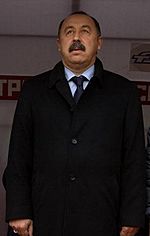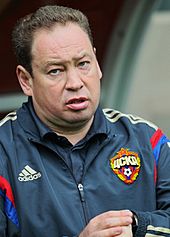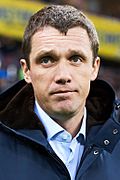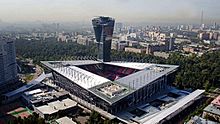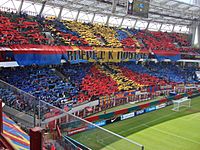PFC CSKA Moscow facts for kids
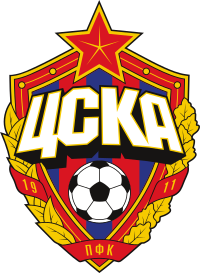 |
|
| Full name | Профессиональный футбольный клуб ЦСКА |
|---|---|
| Nickname(s) | Koni (Horses) Krasno-sinie (Red-blues) Armeitsy (Army Men) |
| Founded | 27 August 1911 |
| Ground | VEB Arena |
| Capacity | 30,457 |
| Owner | VEB.RF |
| President | Evgeniy Giner |
| Head coach | Fabio Celestini |
| League | Russian Premier League |
| 2024–25 | Russian Premier League, 3rd of 16 |
Professional Football Club CSKA, often called CSKA Moscow, is a famous Russian football team. It is based in Moscow, the capital city of Russia. The team plays its home games at the VEB Arena, which can hold about 30,000 fans. CSKA Moscow is known for its red and blue colors.
The club started in 1911, making it one of Russia's oldest football teams. They had a very successful time after World War II, winning many championships. Overall, they have won 7 Soviet Top League titles and 5 Soviet Cups. After the Soviet Union ended, they continued their success, winning 6 Russian Premier League titles and 8 Russian Cups.
CSKA Moscow made history in 2005. They became the first Russian club to win a major European competition, the 2004–05 UEFA Cup. They beat Sporting CP in the final match held in Lisbon, Portugal.
For a long time, CSKA was the official team of the Soviet Army. After the dissolution of the Soviet Union, the club became privately owned. Today, the state-owned company VEB.RF controls most of the club's shares.
Contents
Club History
Team Names Over Time
CSKA Moscow was founded in 1911. Like many clubs from the former Soviet Union, its name changed several times.
- 1911–1922: Amateur Society of Skiing Sports (OLLS Moscow)
- 1923: Experimental & Demonstrational Playground of Military Education Association (OPPV)
- 1924–1927: Experimental & Demonstrational Playground of Military Administration (OPPV)
- 1928–1950: Sports Club of Central House of the Red Army (CDKA)
- 1951–1956: Sports Club of Central House of the Soviet Army (CDSA)
- 1957–1959: Central Sports Club of the Ministry of Defense (CSK MO)
- 1960–present: Central Sports Club of Army (CSKA)
The football part of the club has been known as PFC CSKA Moscow since 1994.
Early Years and First Wins
The football club's story began in 1911. This is when a football section was created within the Amateur Society of Skiing Sports (OLLS).
In 1922, OLLS won the spring Moscow championship. They also won the KFS-Kolomyagi Cup and the Tosmen Cup that year. These early wins showed the team's potential.
The Soviet Era
Winning Championships and Facing Challenges
CSKA had its most successful period right after World War II. A legendary player named Grigory Fedotov, who is still the team's top scorer, played for them then. In 1945, they finished second in the Vysschaya Liga.
Then, they won three championship titles in a row, which was a first for the league. They also won their second Soviet Cup in 1948. This was a "double" win, meaning they won both the league and the cup. The team was even called the "Team of Lieutenants" because many players were from the army. In 1951, playing as CDSA, they won another double. Some players, like Vsevolod Bobrov, were so talented they played both football and ice hockey for the club.
After these great years, the 1952 Olympic Games in Helsinki brought a tough time for CDSA Moscow. Many of the club's players were on the national team. They lost a famous match against Yugoslavia. This loss had big consequences for the club. CDSA was forced to stop playing in the league and was even disbanded for a short time.
The club was re-established in 1954. Soon after, they won the Soviet Cup in 1955. Fans then waited 15 years for the next big trophy. In 1970, CSKA became Soviet champions for the sixth time. They won a thrilling playoff match against Dynamo Moscow. This win allowed them to play in the European Cup. They beat Galatasaray but were later knocked out by Standard Liège.
Later Soviet Years
The club faced a tough period from 1971 to 1991. In 1984, they were relegated to the second division for the first time. They spent two seasons there before returning to the top league. However, they were relegated again in 1987.
Despite these challenges, CSKA fought their way back. They finished second in the first division and then won the very last Soviet football championship in 1991. They also won the Soviet Cup that year, completing a "golden double." This championship win qualified them for the 1992–93 UEFA Champions League. They had some impressive wins, including beating Barcelona. However, they were eliminated in the group stage.
The Modern Era
Returning to the Top (1992-2004)
After the Soviet Union broke up, CSKA Moscow was one of the first teams in the new Russian Top Division. For the first few seasons, they finished in the middle of the league table. In 1998, they finished second, and in 1999, they came in third.
In 2002, under coach Valery Gazzaev, the team finished second again and won the Russian Cup. In 2003, they won their first championship in the Russian Premier League. After a brief change in coaches, Valery Gazzaev returned. CSKA finished second in 2004.
The Golden Years (2005-2010)
In 2004, CSKA played in the 2004–05 UEFA Champions League. They finished third in their group, which meant they moved to the UEFA Cup. Their journey in the UEFA Cup was amazing. They beat teams like Benfica, Partizan, and Auxerre. In the semifinals, they defeated Parma.
On May 18, 2005, CSKA Moscow made history. They won the 2004-05 UEFA Cup by beating Sporting CP 3-1 in Lisbon. This was the first time a Russian team won a European competition! Later that year, they also won their second Russian championship and the Russian Cup, completing a "treble" (winning three major trophies in one season).
In 2006, CSKA won another domestic treble: the Premier League, the Russian Cup, and the Russian Super Cup. They continued to play in European competitions, including the 2007–08 UEFA Champions League, and won the Russian Super Cup in 2007.
In 2008, CSKA won the Russian Cup for the fourth time. In 2009, they reached the quarter-finals of the Champions League for the first time. They beat Sevilla FC but were eventually knocked out by Inter Milan. The club also won the Russian Supercup and the Russian Cup again in 2009.
The Slutsky Era
Leonid Slutsky became the head coach in October 2009. In the 2010 Russian Premier League season, CSKA finished second. They also reached the round of 16 in the 2010–11 UEFA Europa League.
In the 2011–12 UEFA Champions League, CSKA made it to the knockout stage. They beat Inter Milan in a key match to finish second in their group. In the round of 16, they faced Real Madrid and were eliminated. To celebrate the club's 100th anniversary, CSKA won its sixth Russian Cup in 2011.
In the 2012–13 season, CSKA won the Russian championship. This was their eleventh league title. They also won the Russian Cup, achieving another double.
As champions, CSKA played in the 2013–14 UEFA Champions League. They were in a tough group and finished last. However, in the domestic league, they won their second championship title in a row in a thrilling finish.
In the 2015–16 season, CSKA again reached the Champions League group stage. They won their sixth Russian title (and 13th overall) that season. After a difficult period in late 2016, coach Leonid Slutsky left the club.
Under Viktor Goncharenko
Viktor Goncharenko became the new manager in December 2016. CSKA finished second in the 2016–17 Russian Premier League. They then qualified for the 2017–18 UEFA Champions League group stage. They finished third in their group and continued to play in the Europa League, reaching the quarter-finals.
In 2018, many key players left the club. Despite this, CSKA started the season well. They even beat Real Madrid twice in the UEFA Champions League group stage. Goncharenko left the club in March 2021.
Recent Years
Former player Ivica Olić became head coach in March 2021 but left after only nine games. Aleksei Berezutski then took over as head coach. In February 2022, CSKA faced challenges due to international sanctions. Despite this, they had a strong run in the league. Berezutski left in June 2022.
Vladimir Fedotov was appointed as the new head coach. He led CSKA to second place in the 2022–23 Russian Premier League. CSKA also won the 2022–23 Russian Cup.
Marko Nikolić became CSKA manager before the 2024–25 season. In the 2024–25 season, CSKA finished third in the Russian Premier League and won the 2024–25 Russian Cup.
Stadium
CSKA Moscow used to have a small stadium called LFK CSKA. For many years, they played their home games at the Grigory Fedotov Stadium. This stadium was taken down in 2007 to make way for a new one.
While their new stadium was being built, CSKA played most of their games at the Arena Khimki and Luzhniki Stadium. The new stadium, Arena CSKA, officially opened on September 10, 2016.
In 2017, the stadium was renamed VEB Arena after a company called VEB.RF bought the naming rights. Sometimes, for big matches like those in the UEFA Champions League, CSKA plays at the larger Luzhniki Stadium.
Honours
CSKA Moscow has won many important titles throughout its history.
Domestic Titles
- Soviet Top League / Russian Premier League (Top-tier league)
- Winners (13): 1946, 1947, 1948, 1950, 1951, 1970, 1991, 2003, 2005, 2006, 2012–13, 2013–14, 2015–16
- Runners-up (13): 1938, 1945, 1949, 1990, 1998, 2002, 2004, 2008, 2010, 2014–15, 2016–17, 2017–18, 2022–23
- Soviet First League / Russian National Football League (Second-tier league)
- Winners: 1986, 1989
- Soviet Cup / Russian Cup
- Winners (14): 1945, 1948, 1951, 1955, 1990–91, 2001–02, 2004–05, 2005–06, 2007–08, 2008–09, 2010–11, 2012–13, 2022–23, 2024–25
- Soviet Super Cup / Russian Super Cup
- Winners (8): 2004, 2006, 2007, 2009, 2013, 2014, 2018, 2025
European Titles
- UEFA Cup / UEFA Europa League
- Winners: 2004–05
- UEFA Super Cup
- Runners-up: 2005
CSKA in European Football
CSKA Moscow has played many matches in European competitions.
| Competition | P | W | D | L | GS | GA | %W |
|---|---|---|---|---|---|---|---|
| European Cup / UEFA Champions League | 34|24|46|125|155|32.69 | ||||||
| UEFA Cup / UEFA Europa League | 31|18|20|97|67|44.93 | ||||||
| Cup Winners' Cup | 2|0|2|5|5|50.00 | ||||||
| UEFA Super Cup | 0|0|1|1|3|0.00 | ||||||
| Total | 67|42|69|228|230|37.64 |
Players
Current Squad
|
|
Retired Numbers
- 12 – This number is retired for the club's supporters, who are seen as the "12th man" on the field.
- 16 – This number honors Serhiy Perkhun, a goalkeeper who played for CSKA in 2001. It was retired after his passing.
Notable Players
Many great players have worn the CSKA jersey. Here are some who also played for their national teams. Players whose names are in bold played for their country while at CSKA.
- USSR/Russia
 Igor Akinfeev
Igor Akinfeev Aleksei Berezutski
Aleksei Berezutski Vasili Berezutski
Vasili Berezutski Fyodor Chalov
Fyodor Chalov Alan Dzagoev
Alan Dzagoev Mário Fernandes
Mário Fernandes Aleksandr Golovin
Aleksandr Golovin Sergei Ignashevich
Sergei Ignashevich Dmitry Kirichenko
Dmitry Kirichenko Dmitri Kuznetsov
Dmitri Kuznetsov Ahmed Musa
Ahmed Musa Ivan Oblyakov
Ivan Oblyakov Sergei Semak
Sergei Semak Albert Shesternyov
Albert Shesternyov Georgi Shchennikov
Georgi Shchennikov Yuri Zhirkov
Yuri Zhirkov
- Europe
 Elvir Rahimić
Elvir Rahimić Ivica Olić
Ivica Olić Nikola Vlašić
Nikola Vlašić Tomáš Necid
Tomáš Necid Roman Eremenko
Roman Eremenko Bibras Natcho
Bibras Natcho Miloš Krasić
Miloš Krasić Zoran Tošić
Zoran Tošić Rasmus Elm
Rasmus Elm Pontus Wernbloom
Pontus Wernbloom
- South America
- Africa
 Seydou Doumbia
Seydou Doumbia Ahmed Musa
Ahmed Musa Chidi Odiah
Chidi Odiah
- Asia
 Keisuke Honda
Keisuke Honda Abbosbek Fayzullaev
Abbosbek Fayzullaev
Club Records
Most Appearances
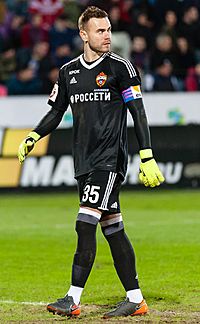
The players who have played the most games for CSKA Moscow are:
| Name | Years | Total Games | |
|---|---|---|---|
| 1 | 2003–present | 797 | |
| 2 | 2004–2018 | 540 | |
| 3 | 2002–2018 | 531 | |
| 4 | 2001–2018 | 502 | |
| 5 | 1960–1975 | 427 |
Top Goalscorers
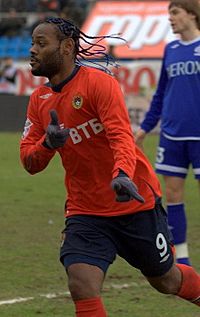
These players have scored the most goals for CSKA Moscow:
| Name | Years | Total Goals | |
|---|---|---|---|
| 1 | 1938–1949 | 161 | |
| 2 | 2004–2011, 2013 | 124 | |
| 3 | 1940–1952 | 118 | |
| 4 | 1939-1952 | 104 | |
| 5 | 1945–1949 | 102 |
Supporters and Rivalries
CSKA Moscow fans have friendly relationships with supporters of other clubs. These include Partizan from Serbia, PAOK FC from Greece, and CSKA Sofia from Bulgaria. They also get along with fans of Dynamo Moscow in Russia.
The biggest rival for CSKA Moscow is Spartak Moscow. Matches between these two teams are known as the "Main Moscow derby."
Team Nicknames
CSKA was first nicknamed Horses because their early stadium was built on an old horse racing track in Moscow. At first, some people thought this nickname was rude. But over time, it became a proud name used by players and fans. Other nicknames for the team include Army Men and Red-Blues, referring to their history and colors.
CSKA Women's Team
CSKA also has a successful women's football team, ZFK CSKA Moscow. The original women's team started in 1990. After a break, a new CSKA women's team was formed in 2016.
In 2017, the women's team became an official part of the CSKA club. They won their first title, the Russian Women's Cup, that same year. In recent years, CSKA Women have won two Russian championships in a row, in 2019 and 2020. They have also played in the UEFA Women's Champions League.
See also
 In Spanish: PFC CSKA Moscú para niños
In Spanish: PFC CSKA Moscú para niños


